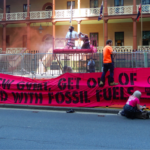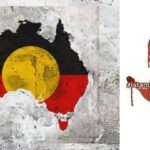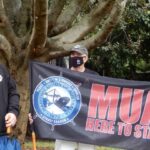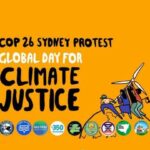Opposition to Santos Gas in the Pilliga Is the Largest Ever Seen, Say Gomeroi Women
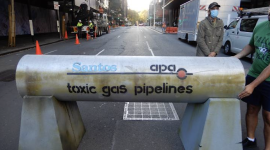
The Gomeroi people voted overwhelmingly against Santos’ proposed Narrabri gas project at a meeting in Tamworth on 25 March.
The Australian fossil fuel company has been negotiating with the Gomeroi Nation going back a decade, and this rejection was to an offer put directly to it by Santos that month.
The company wants to drill 850 coal seam gas wells across 1,000 hectares of Gomeroi Country, the majority being the Pilliga Forest, in northern NSW. The site sits above the Great Artesian Basin, one of the largest freshwater reserves on Earth, and the wells will go straight through it to get to the gas.
During its project inquiry, the NSW Independent Planning Commission received 23,000 submissions, 98 percent of which were against it. But it greenlighted the destruction of Gomeroi Country anyway in September 2020, with the Morrison government following suit two months later.
However, the Tamworth rejection by the Gomeroi Nation hasn’t brought the issue a close, because 10 months earlier, Santos went to the National Native Title Tribunal and asked it to grant approval to the Narrabri gas project without the consent of the sovereign owners. The NNTT decision is pending.

Ongoing land grabs
Despite the climate-driven megafires of the 2019-2020 summer, then PM Scott Morrison announced the gas-led recovery in September 2020, which involves the opening up of five new gas basins nationwide, with the site in Narrabri being one of the key areas to be destroyed.
The Gomeroi people have been the custodians of the region for tens of thousands of years. And they’ve filed a native title claim over their land with the tribunal, however Santos is petitioning it be disregarded for its short-term profiteering off a resource that’s fast becoming obsolete.
Despite the Albanese government flashing its climate credentials since coming to power, there are no signs that it will be rejecting the Santos project. Indeed, the new PM is currently spinning a tale, as he casts the Greens as the cause of climate inaction in this country.
But there’s a groundswell of opposition to the Narrabri gas project amongst the continent’s wider population, with a rising tide acknowledging the brutal dispossession that First Nations peoples continue to be subjected to, along with the increasing evidence that the climate crisis is upon us.
Neocolonialism
Launched in January, The Pilliga Project reveals that if Santos gains approval, there are plans for the gas fields to continue expanding. In this regard, the Perrottet government last month approved the reawakening of “zombie” exploration licences Santos owns across the Liverpool Plains.
Gomeroi woman Aunty Deborah Briggs spoke at the launch of the documentary, explaining that her people staunchly oppose the incursions onto Country, despite increasing pressure for them to step aside.
Sydney Criminal Lawyers spoke to Aunty Deborah and Gomeroi woman Aunty Suellyn Tighe about the site sitting in the foodbowl of the nation, how ongoing First Nations dispossession is facilitated through legislation these days, and the fierce opposition to Narrabri gas, which is only growing.
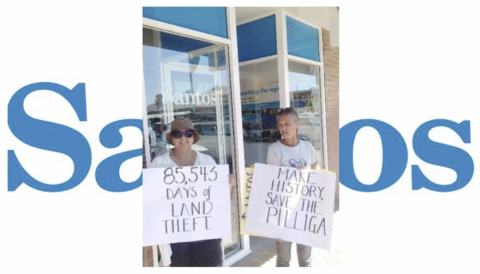
Aunty Debra, right now, as we speak over the phone, you’re sitting beside the Naomi River with Aunty Suellyn. And that waterway is already being contaminated by fossil fuel interventions in the local region.
So, how is the Narrabri gas project impacting the local area in this pre-rollout stage?
Aunty Deborah: There are a lot of social impacts that occurred straight away when the mines started coming to town. It’s a small community, which increased in population with the staff that fly in and out.
So, rents went up. The price of everything went up. It’s difficult to live in a housing commission estate and watch, across the railway line, the new housing estates that have been built for workers.
And in terms of Santos, the company has already been doing exploratory drilling in the area.
Aunty Deborah: Yes. Santos had a 20 percent share with Eastern Star Gas, which has been drilling in the Pilliga Forest for 22 years.
There are about 30 wells already down in the forest. There are already wells down on the Liverpool Plains, near Werris Creek.
They’re not being honest with community in regard to what exploration is, because they’re already active and they’re already selling the gas. Infrastructure is already down. Gas lines are already down. The roads have already been widened.
There’s a mega-pond, the size of ten Olympic swimming pools, to store all the toxic water produced. There are actually two of those. You can see them by satellite.
And there is much more to come if the project goes ahead?
Aunty Deborah: Yes. This is just exploration. So, they’re putting in 850 wells into acres of what used to be state forest. And they’re putting in applications for PELs (petroleum exploration licences) to extend onto the Liverpool Plains, right through to Moree.
Aunty Suellyn: We’re talking about the foodbowl of Australia here. So, this is going to have a huge impact. There are zombie PELs that haven’t been in use. And about a month ago, they reactivated these exploration licences on the Liverpool Plains.
It has been a big shock to farmers over that way. I went to a meeting in Mullaley, where they were discussing what could happen with this move and what options the property owners have.
While I was at the meeting, the stark difference of what is available to them as compared to us, the Gomeroi Nation in the Pilliga, became clear. It’s vastly different.
Farmers have the potential to enter into a land use agreement, and they can veto drilling on their property. We’ve never been offered that by Santos. We don’t have a right to veto.
This is different to what happens in the Northern Territory because their main legislation deals with land rights, and there’s a provision for First Nations people to veto.
But NSW and other states operate under the native title legislation, and there’s no right to veto. There is an avenue to give First Nations people the right to veto, but it’s been blocked.
Why should we in NSW have no veto capacity, when there is potential for it in the Northern Territory under the Land Rights Act?
And as Deb was saying about the social impacts, it’s causing division in the community. Some Aboriginal people for the first time in a generation may be employed in the mines, but that causes division within families and community as well.
The Narrabri lands council is in agreement with the project, whereas the community is not in favour of Santos. There are big social issues within the community, and it’s directly linked to Santos and the mining.
Aunty Deborah: The community in general is in conflict with the shire council. And there’s a mayor with a personal business that hugely profits from Santos.
Aunty Suellyn: There are businesses that are linked and aligned with Santos, which are used to manipulate community and the way people see mining.
So, if you look at it purely from a business level where you’ve got local businesses – like truck owners, electricians and mechanics – they can benefit because of Santos’ interest.
Coal mining already exists in Narrabri. So, these businesses have a chance, again, to increase their profit margin.
Where there is mining, the trade work is being soaked up, so much so that locals can’t access tradespersons, or the cost becomes inflated so much because the mining companies can pay huge money.
Aunty Deborah: There is also the impact on Gomeroi customs, and our trying to attempt to be Gomeroi people out in the forest. Now we’re having altercations with fly in-fly out workers and we’re also having to deal with security cameras.

At a meeting in Tamworth in March, the Gomeroi people overwhelmingly rejected the Santos project. So, if it does go ahead, what’s it going to mean for your people?
Aunty Deborah: The first impact we’ll experience is to our water supply, because they’re going to drill through the Great Artesian Basin. And once that’s contaminated, it’s going to affect every river system from here to the Murray-Darling Basin, and out to the ocean.
There’s going to be global impact, and we don’t know exactly what’s in the toxic crap that they’re bringing up through the drilling.
The second thing is going to be the atmosphere, with the methane and whatever else is leaking from 850 wells. We’ve got endangered species up here. And what’s it going to do to the poor health outcomes we already have?
Aunty Suellyn: A huge amount of toxic salts will be produced. I watched one of the Independent Planning Commission presentations here in Narrabri, and a young scientist was saying that the salts that were going to be extracted over the 20 year lease are going to be 87 times the weight of the Eiffel Tower.
This toxic salt can’t be got rid of. One plan Santos has is to store the salts in a disused coal mine shaft in the area.
Aunty Deborah: Another plan was to use the salts on properties where there’s livestock. They’re trying to produce grain crops, and they’re watering all the roads with the toxic salts.
So, they’re planning on using this on our food, and what’s that going to do to human consumption?
Aunty Suellyn: At one time, they were talking about incinerating the salt so that it becomes like potash. But you can’t do that because once you do, you release the toxins into the air.
The water they’re planning to pump into the containment ponds are extremely dangerous, because since the drought broke, we’ve had unusually heavy rain, and when we get that rain, there’s the potential for those ponds to break their banks and flow downstream into the Namoi.
That is a risk they haven’t mitigated that can affect flora, fauna, plants and animals. It’s water being contaminated on the surface, as well as the contamination of the Great Artesian Basin. Then we’ve got groundwater contamination as well.
It just doesn’t make sense that this project goes ahead, because there are so many issues with it. We’ve got fugitive gas emissions, which is where the system leaks. The system is not foolproof.
The amount of fugitive emissions will almost be as close to the amount that they’re going to extract. And these fugitive emissions don’t get counted. It’s what they call scope 3 emissions.
These scope 3 emissions, which aren’t counted, will affect our emissions target for 2030. Then if they sell the gas to another country, we don’t count those emissions in the 2030 targets.
For us, as Gomeroi people, that’s a clash in culture. If a snake crawls on Country or a fish swims in our river or a bird flies over our Country or a wombat burrows in it, our philosophy is that while it’s in our Country, we have a responsibility to look after it.
So, when it moves on to our Country it should be perfect, and when it enters a neighbouring nation, it should also be perfect when it does. This is the same for water.
So, these scope 3 emissions, which our government does not acknowledge, are still escaping from our Country, which is a cultural conflict for us, because we have a mutual obligation.
The government might deny the impact that the project is going to have, but for the Gomeroi Nation, it’s our responsibility to look after our neighbours.
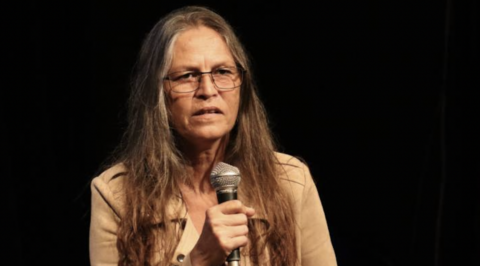
Santos lodged a future act determination application to the Native Title Tribunal, which aims to override Gomeroi native title to Country, despite the Tamworth vote.
How is the Santos application going? And what does this development tell us about the Native Title Tribunal?
Aunty Deborah: It’s rigged. The only ones who are going to benefit from that are the mining companies taking us to court.
It’s not just Santos, it’s multiple mining companies: gold, gas, coal, cobalt. We even have NASA coming here and trying to take some rare rock from our mountain.
The mountain is a place in the Nandewar Range, we Gomeroi people call Ninghdoo. In our language that means sleeping volcano.
So, we’ve got a dormant volcano, and because of the mining here we’ve had small earthquakes, so we know they’ve already cracked the basin.
These things are put in place for our future generations, and like Suellyn said, we’re just caretakes and we can’t abide by our laws and obligations as custodians and allow this sort of plan to go through because we can’t guarantee our freshwater.
At the moment, we’ve told children that they can’t swim in the Naomi River and that’s just devastating for the Gomeroi people, whose lives revolve around the river system.
And this is happening before Santos’ full rollout.
Aunty Suellyn: Yes. There are only exploratory wells out there so far.
Aunty Deborah: The Naomi rolls into the Barwon River and Walgett has just had massive fish kills out here. We point to the cotton industry, which is another industry that takes ownership.
We’re in court now about the floodwaters being hoarded for the benefit of the cotton and coal mining industries, and it’s getting pretty rough, where you’ve got food growers and livestock farmers that can’t afford water licences.
And like we said before, this is the foodbowl that feeds the nation. What are we going to eat? We can’t eat this gas and coal.
Aunty Suellyn: I want to refer back to your tribunal question. The understanding of the Native Title Tribunal is it’s almost a contradiction of terms because the facts don’t bear out that it’s a fair process.
It’s a rigged process because when it comes to proposals, as First Nations people, we can always say no, but we will end up in the tribunal.
And the statistics show that in 2020, there were about 123 cases before it, and of those, only three cases were decided in favour of First Nation peoples. And none of those decisions were in NSW.
There’s a claim in over the Gomeroi Nation by the Gomeroi people. This is a blanket claim that goes over the whole nation.
The claim is up to the Queensland border, because while the Gomeroi Nation traditionally goes over the border, we’re under NSW legislation, so we can only take it that far.
In terms of NSW and the claim that’s there, we’re in a holding pattern, in the sense that, evidence has been presented by both the Gomeroi Nation and Santos, and the process is to re-enter negotiations.
The information that has come out of that process has gone back to the president of the tribunal and now we’re waiting for a decision.
My understanding is that anytime the minister for the environment, who happens to be Tanya Piibersek, can say that it’s enough and the mine won’t go ahead.
There’s the potential for the minister to override the tribunal decision. The way it’s set up now is the minister can make a decision that favours the Gomeroi Nation or it doesn’t.
If we get in a situation where the minister makes a decision against the Gomeroi Nation, we can’t appeal on a point of law. We have to appeal at an administrative level, so where some process wasn’t followed.
No matter which way we go, we’re hovelled. And we have ministers there now that have the power to stop it.
The country has been grappling, as well as trying to supress, the history of violent dispossession the British subjected First Nations people to on invasion.
Is the gas project different from this past dispossession or do you consider it part of the same ongoing colonial project?
Aunty Deborah: It’s the same. They came here to harvest resources, and that’s what they’ve been doing for the past 234 years.
Aunty Suellyn: I put it this way, since the First Fleet landed on 26 January 1788, there has been approximately 85,000 days, and, on each of those days, there has not been one where First Nations Country has not been affected.
There has not been a day when the environment has not been destroyed in some manner, whether that’s being cut down, ploughed, forest being cleared or rivers being damned.
That’s a long time, and a lot to be happening. In that sense, when is it ever going to be enough?
We’ve been impacted from the First Fleet landing until present day. There has not been a day when any of this land clearing or dispossession of Aboriginal people has not occurred. That’s a huge thing, and people don’t recognise it in those terms
So, how much can the environment take? And how much more do Aboriginal people have to sacrifice, in terms of their cultural connections to the land, they’re symbiotic relationship to the land and their story.
You have to understand that by the time they got to Australia, they were very practised with what they did. So, it was almost down pat. And the situation hasn’t changed.
We’ve entered into a neocolonial stage where it’s legislation that’s used now. For instance, in land rights, an Aboriginal person is not technically an Aboriginal person unless they’re understood to be under the Land Rights Act.
So, to be an Aboriginal person, you have to meet those three criteria. That’s legislated.
The only people in Australia that I’m aware of who have to go through a legislative process to prove their identity are First Nations people.
That hasn’t changed. That’s neocolonialism. It’s the new way Aboriginal people are dispossessed.
It’s through new legislation. The watering down of the Land Rights Act, and John Howard’s 10 Point Plan watering down native title as well. That’s all neocolonialism at work.
And lastly, the Gomeroi Nation has a lot of support amongst the wider community. The MUA released a declaration in March stating its firm support for the Gomeroi campaign.
MUA Sydney Branch secretary Paul Keating said last week that “there’s going to be significant community backlash” if the project gets the greenlight.
So, if Santos is successful in its application to the Native Title Tribunal, what do you consider will be the response?
Aunty Deborah: Well, I don’t think we’re alone. Like you said, we’ve got the union support and that’s encouraging. It brings me hope to know that we have support to just continue to be Gomeroi people. It’s very encouraging.
So, yeah, we’re going to dig in. Santos is going to have a fight on their hands. We’re talking about our sovereign rights and our water and our home. So, yeah, we’re going to fight the best we can.
We’re going to encourage the wider population. We can’t instigate massive protests or anything these days, because of the changing of the law to keep you in line.
We’ll do things like Gomeroi people have always done, and there is no law against us being Gomeroi people on Country.
So, I guess we’re going to have to see just how far this law thing can stretch and hope for the best, and to encourage the wider population to come holiday in the Pilliga.
Aunty Suellyn: I agree that it’s great that the MUA and other unions have come onboard, because there is a history of change coming from unions.
For them to come on board and be supportive for us as a nation is very encouraging.
It shows that it’s not just the Gomeroi Nation, and the Aboriginal people across Australia where they’re having these same struggles. It shows it’s not just us who are concerned for this, it’s the wider community.
I just want to bring it back to the Independent Planning Commission. There were over 23,000 objections to Santos’ profiteering in the Pilliga submitted to the IPC.
Then we’ve got the unions coming on board, grassroots people like myself and Deb, and then there’s the environmental movement.
We’re all in opposition to the fossil fuel companies destroying land. So, when the bloody hell are our politicians going to listen to us as people, as voters and as citizens of Australia?
Although, us, as Aboriginal people, we haven’t been citizens for as long as other people have.
When are they going to listen to the people, because never before in Australia has there been such a mobilisation against a fossil fuel company in terms of the Pilliga?
It’s a record-breaking number, and yet, they chose not to listen to that. They chose not to hear Aboriginal voices.
That’s another example of neocolonialism. There were outpourings of people saying no. There were lots of submissions to the IPC.
So, with that, again, when are our politicians going to step up? When are the ones in federal and state politics going to step up and listen to the people?
They need to say that they’re not going to go against the people for the financial bottom line, or the kickbacks that government gets through taxes, or the kickbacks that local governments might get or the profits of global conglomerates.
They need to say they’re not going to be the politicians who profiteer off of Aboriginal people and their own electorates.
The Gomeroi Nation is under siege. We’re under siege from fossil fuel companies, coal mining and gas extraction. We’ve got gold wanting to go around mining. We have rare earth exploration happening on our Country now.
We’ve got multiple coal mines. Here at Narrabri, in Muswellbrook, in Werris Creek and in Gunnedah. We’ve got it at Maules Creek. There’s a tender for the biggest overland railway bridge around.
That’s all happening here. So, when is the government going to listen to us, instead of them having to listen to the bottom dollar and fill their own pockets?
Deb and I are grassroots people, who struggle on a daily basis, living below the poverty line, and then these politicians are sitting there with their fat purses.
If they fell off their wallets, they’d break their necks, I reckon. That’s how fat their purses are.
They have to think of us, as Aboriginal people, as citizens of Australia, as global citizens even. Because the trend against fossil fuels is on a global basis, and experts say there should be no more fossil fuels. And yet, Australia always seems to fly in the face of that.
The dollar value of gas is looking like it’s going to drop. And in all honesty, I hope Australia gets sanctioned.
Sadly, it’s going to be the global voice that stops it, when it’s no longer financially viable, and all those profiteering, including our politicians, aren’t, that’s when things will change.
Aunty Deborah: We’ve got resource companies holding the nation to ransom and it has to stop.
Aunty Suellyn: We, as the Gomeroi Nation, which is under siege by these fossil fuel companies, why should we have to sacrifice our cultural wellbeing, our spiritual places and our sites, and even just our Country, for the gas-led economic recovery?



